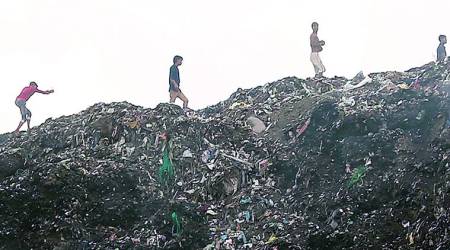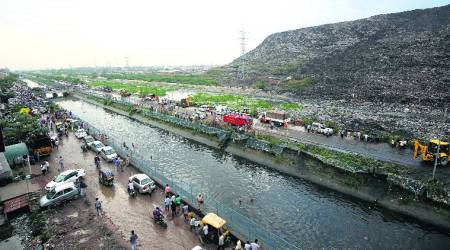 The game involves ignoring the stench, avoiding swooping crows and vultures, and keeping your balance on the landfill’s treacherous slopes while looking for something worthwhile.
The game involves ignoring the stench, avoiding swooping crows and vultures, and keeping your balance on the landfill’s treacherous slopes while looking for something worthwhile.
Most didn’t expect anything to change at Ghazipur landfill. But as orders arrived that the landfill had been closed, the neighbourhood of ragpickers that live there was suddenly faced with an uncertain future. Garbage, they said, is their livelihood. Take, for instance, Roshan Ali (12), who has lived next to the landfill since he was born at the ragpickers’ colony in Ghazipur. His parents moved here from Assam. “My father died soon after. My mother works here, too. It’s not a great job, but it’s fun — like a game,” he said.
The game involves ignoring the stench, avoiding swooping crows and vultures, and keeping your balance on the landfill’s treacherous slopes while looking for something worthwhile. “It could be anything,” he said, adding that on good days, he can earn up to Rs 100. There is no official estimate of the number of ragpickers in Delhi, although some environmentalists peg it at 3.5 lakh. Roughly a third of them have worked and lived at Ghazipur landfill for a decade. A majority of them are migrants from Bihar, Bengal or Assam — with no voter ID cards.
The colony of ragpickers — some huts about 200 metres from the landfill — was flooded on Saturday. Negotiating her way through the knee-deep water, Hafiza Begum (37) said, “How can they shut down the landfill. We live here, this is our life. What are we supposed to do?”
Shabnam Khatun (27) reiterated that no one wants to live at a place where death is common, and disease even more so. “Birth defects are common. Everyone has asthma or stomach illness. Every year, someone dies of cancer. The water tastes of metal, we know it’s poisonous. But we have nowhere to go,” she said. Life and livelihood at Ghazipur revolves around Delhi’s waste — plastic bottles, metal amulets, even human hair — and putting a value on it. But with no fresh trash coming in, the ‘merchandise’, now spoilt by the elements, has lost value. Arshad Ali (24) initially refused to believe that the batch of trucks that came in carrying garbage might be the last. “Metal and plastic dumped for too long doesn’t sell. How can they not come? No one wants to be here, but what will we do?” For now, there are no answers and, for once, no garbage.

